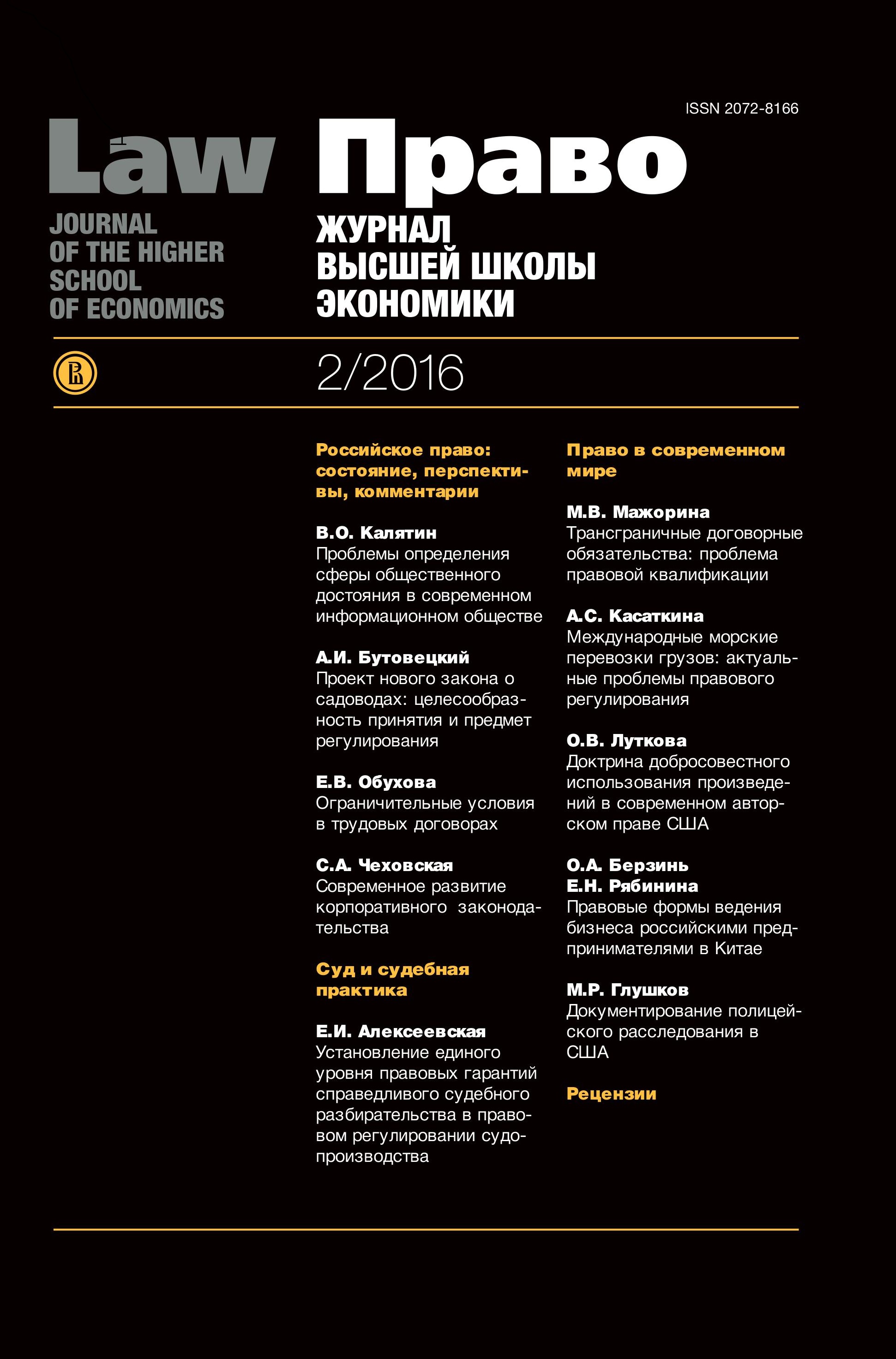Ограничительные условия в трудовых договорах
Аннотация
В ходе трудовой деятельности работник получает доступ к коммерчески ценной информации о работодателе, включая особенности организационной структуры, ведения бизнеса, данные о клиентах и иную. Интерес работодателя в сохранении такой информации очевиден. Прекращение трудовых отношений влечет для работодателя значительные риски: помимо прямых убытков, которые, по оценкам, могут достигать шести годовых зарплат работника, результатом его увольнения может стать утрата хорошей деловой репутации, потеря клиентов (так называемый goodwill), конкуренция с бывшим работником, «переманивание» клиентов и других работников. В зарубежных странах права и законные интересы работодателя при расторжении трудового договора защищаются в значительной степени. Минимизация рисков работодателя достигается различными способами, в том числе путем включения в трудовой договор «ограничительных условий» (restrictive covenants), запрещающих работнику осуществлять определенную деятельность после расторжения трудового договора. Палитра применяемых за рубежом ограничительных условий обширна: это запреты конкурировать с работодателем, ограничение трудоустройства на определенной территории, запрет «переманивать» клиентов и коллег и иные ограничения. В свою очередь, российское законодательство предлагает сравнительно небольшой набор способов разрешения подобных проблем. В то же время число судебных споров о допустимости «премий за лояльность», «запретов конкуренции» и иных ограничительных условий растет. Целью настоящей статьи является обзорное ознакомление читателя с некоторыми способами решения проблем конкуренции работника и работодателя в отдельных зарубежных странах, критериями, на которые обращает внимание суд при оценке действительности ограничительного условия. Также приводятся подходы к регулированию данной сферы российского законодательства и некоторые тенденции судебной практики.
Литература
Bowie A. (2014) Restrictive Covenants Under New York Law. New York Law Journal, pp. 269-306.
Demidov N.V. (2015) Trudovoe pravo Rossii: sistemnye problemy istorii i sovremennosti [Russian Labor Law: System Issues in History and Modernity]. Zhurnal rossiyskogo prava, no 11, pp. 106-113.
Ershova E.A. (2013) Gudvill biznesa [Business Goodwill]. Moscow: Statut, 223 p. (in Russian)
Eylert M. (2006) Non-Competition Clauses in Labor Contracts. Available at: http://www.ilo.org/wcmsp5/groups/public/---ed_dialogue/---dialogue/documents/meetingdocument/wcms_159962.pdf (accessed: December 1, 2015)
Kamerling A. (2007) Restrictive Covenants under Common and Competition Law. London: Sweet and Maxwell, 538 p.
Karapetov A.G., Savel'ev A.I. (2012) Svoboda dogovora i ee predely [Freedom of Contract and its Limits]: T.1. Teoreticheskie, istoricheskie i politiko-pravovye osnovaniya printsipa svobody dogovora i ego ogranicheniy [Vol. 1. Theoretical, Historical and Political Fundamentals for Freedom of Contract and its Limitations]. Moscow: Statut, 452 p. (in Russian)
Kiselev A. (2013) Naem i uvol'nenie po-finski [Employing and Dismissing in Finnish Fashion]. EZh-Yurist, no 21, pp. 15-16.
Knyazeva N.V., Mokhnatova E.A. (2011) Intellektual'nyy potentsial personala: otbor, otsenka, upravlenie [Intellectual Potential: Selection, Choice and Management] Auditorskie vedomosti, no 9, pp. 41-51.
McGregor A. Garden Leave and Post Termination Restraints. Their Interaction and Legal Problems Generated. Available at: URL: http://www.11kbw.com/articles/docs/PostTermsandGardenAMcG.pdf (accessed: December 1, 2015)
Nazmetdinov R. (2013) Pravovoe regulirovanie rabochego vremeni v Soedinennykh Shtatakh Ameriki [Legal Regulation of Working Time in the United States of America]. Kadrovik, no 5, p. 68-71.
Rogova Yu.V. (2015) Dogovor kak sredstvo obespecheniya stabil'nosti grazhdanskogo oborota [Agreement as a Means of Stable Civil Transaction]. Moscow: Statut, 144 p. (in Russian)
Sandeen S. (ed.) (2014) Trade Secrets and Undisclosed Information. Cheltenham: Elgar, 946 p.
Sharma G. (2012) Garden Leave Clause: Restrictive Covenant in Employment Contracts (with Reference to its Applicability in India). Available at: URL: http://ssrn.com/abstract=2141186; http://dx.doi.org/10.2139/ssrn.2141186 (accessed: December 1, 2015)
Stanton A., Kobus J. (2011) Non-Compete vs. Non-Solicitation — Every Business Person Should Know the Difference. Available at: URL: http://www.burkelaw.com/News/Non+compete+vs+Non+solicitation+-+Every+Business+Person+Should+Know+the+Difference (accessed: December 1, 2015)
Wacke А. (1993) Freedom of Contract and Restraint of trade clauses in Roman and Modern Law. Law and History Review, vol.11, no 1, pp. 1-19.
Copyright (c) 2016 Право. Журнал Высшей школы экономики

Это произведение доступно по лицензии Creative Commons «Attribution-ShareAlike» («Атрибуция — На тех же условиях») 4.0 Всемирная.


















